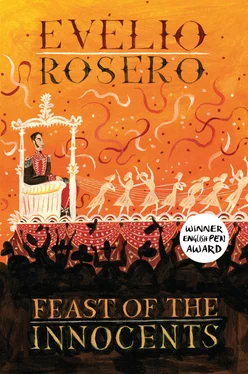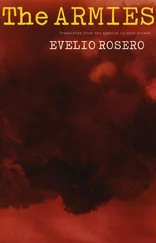“Don’t worry,” he said. “No-one got hurt, this whole misunderstanding’s going to be cleared up: neither you nor Arcángel will have anything to do with what the float says.”
“Dear God,” she fretted. “It would be my biggest sorrow.”
Her eyes roamed across the starry sky; was she going to cry again? She recovered:
“Listen,” she said, “I understand Maestro Abril, I know why he did it, I know him better than I know myself. He’s a good man.”
“Another good man,” the doctor said.
But the pious Alcira did not hear him.
“One afternoon, coming out of church, after Benediction, I bumped into Maestro Abril. He didn’t just say hello, but walked along with me. I don’t know if he already knew, like everyone else, what was in store for him: Arcángel appeared, as he always does, hooting in the Willys, accelerating and slowing down, making all his usual racket when he finds me in the street after Benediction. He came up behind us, Hell itself on our heels. I said to the maestro: ‘Señor Tulio, you don’t need to come with me,’ and he said: ‘Don’t you worry, I’ll stay with you.’ Arcángel caught us up: he hooted more than ever, shouted at the maestro to leave me on my own, he said some things to his face it would be a sin to repeat, Doctor; the whole of Pasto heard them, what an insult, and me so sorry to be the centre of attention. The maestro took my arm, because I tripped and nearly fell over with fright, can you imagine? He didn’t let me go and stayed with me and told my husband that he should get out of the car, to see if he was big enough to make him leave my side, he said that to him, my God, and thank heavens Arcángel didn’t get out: somebody turned up, one of his secretaries, a good angel who tempted him with a meal of guinea pig in Catambuco and took him away, that angel saved us, because Maestro Abril remained stubborn, determined to accompany me, taking my arm: Arcángel would surely have run us both over, he was capable of driving over us a hundred times, out of fury. But the maestro’s bravery was something to see: he wasn’t scared, although he was trembling as much as I was or more, and he was crying like me, from pure courage, God bless his strength of purpose. How rotten I feel, my shame shaming others. I put a good man like Maestro Abril’s life in danger, do you understand? That’s why the maestro got his own back with the float, he was saving my honour, what an upright man. Thank him for me in any case, because it’s the thought that counts at least.”
“Goodbye, Señora Alcira.”
“No,” she said, with an expression the doctor thought was pity for him. “You shouldn’t go in.”
“And why not?” he asked.
She smiled, undecided. He thought she would insist, in order to convince him to go to her husband, for a minute. She gave up, her voice a whisper:
“My regards to your wife.”
And she disappeared down the street: slowly, light-footed, as though afraid of making a noise, she seemed to float. The doctor grasped the door handle again and pushed, at last, as if it were a heavy sheet of lead.
He made the door click audibly as he closed it: best let his presence be known, although it was possible Primavera had already heard his conversation — that depended where she was, he thought.
And straight away he saw her emerging, from the depths of the corridor leading to the guest bathroom, a shadow barely illuminated by the single light bulb switched on, was she still unaware of his presence? She approached with her leather skirt hitched up almost to the waist, bending down — in the middle of the infinitely complex manoeuvre of pulling down the skirt stuck around her thighs — and at the same time he heard her voice. It was hard to make it out.
“I heard the door,” she said, “who was it?”
“Me,” he said.
Primavera Pinzón stopped in astonishment, open-mouthed, just like him.
“A fish bone,” she said.
And despite everything, he discovered, her voice was unchanged, unruffled by the slightest emotion.
Bewildered, he heard her persevere:
“A fish bone got stuck in his throat. I was seeing that he drank some water, in the bathroom.”
The doctor had already moved towards her. They looked at one another numbly.
“A fish bone,” he repeated, and nodded.
In the shadows of the corridor it seemed as though they were trying to work out whether it really was the two of them. As though Primavera were making an effort to remember him: he looked taller and stouter to her, but a chilly aura made him different from her memory, and, for that very reason, at that moment, a stranger, someone truly unknown and dangerous and much stronger than her, alien to the house.
She felt her daughters’ absence made her vulnerable.
But she shook off the fear: it was just her husband, Doctor Donkey, hadn’t he surprised her early that morning dressed as an ape, giving her a preview of his pathetic prank from beginning to end? And wasn’t he even more pathetic now, so hesitant and ultimately deferential towards convention, as expected?
By then, with that almost magical, invisible speed of movement with which every woman dresses and conceals herself, she had finished fixing the skirt and straightened up, slightly flushed, as though with a final scrap of strength.
They both turned to look towards the door of the bathroom where early that morning Doctor Justo Pastor Proceso López had dressed up as an ape: there, through the same doorway, a head stuck out — a different head, a head with moustache and sideburns, that dithered without making up its mind to say hello.
Who can it be? — the doctor wondered.
The truth was, he expected to find a boy —an adolescent, which was the same thing as far as the doctor was concerned — given that he already knew his wife’s secret tastes, her unsuspected love, her outrageous, perpetual desire: boys. With good reason he once heard a whispered conversation between two of his lady patients, who referred to Primavera as “the Cradle Snatcher,” a nickname the doctor found very amusing.
Years before, one afternoon at the finca , he had surprised her at a bend in the river with one of the young labourers, a recently weaned colt — the doctor had thought — a prize yokel, a country boy who must have been for her, with all her respectable reasons, the most wonderful thing in the world; he discovered her right in the middle of the preliminary persuasion while they were each eating a guava, sitting very close to one another on top of a large, white boulder at the river’s edge: the foaming current chattered, swallowing up the laughter, the words. Primavera was wearing that long summer dress he knew so well, grey and frothy with a large flower embroidered on it in gold thread, a dress sprinkled with river spray, here and there, on the shoulders, on the back, wet and sticking between her open legs, where her hands were resting, and she had one foot bared, rosy and small in the grass; the sandal, not far off, lay upside down, as if the foot had freed itself by kicking it off in annoyance. Primavera’s head remained bent downwards; she seemed to be contemplating the tips of her breasts; from time to time her teeth bit into the guava, her lips sucked at it, while one of her hands ran over her long blonde hair as if untangling it; in reality she was sweeping it in shining strands across the boy’s bare shoulder, grazing his skin like real, wounding darts. Primavera never displayed such furious and mute mortification as she did that afternoon, when the doctor disturbed them, saying hello. Primavera loathed him, smiling at him; and the colt fled, stammering.
But tonight was different. This was no strapping youth who leaned out from the doorway. It was General Lorenzo Aipe, a fact that not only amazed the doctor, but disconcerted him: he hardly knew the general, they had been introduced at the governor’s house — when was that? This was not a boy: the general must have reached his half-century, just like him; together they totalled a hundred years. That made all the difference.
Читать дальше












